|
|

by Boyd Magers
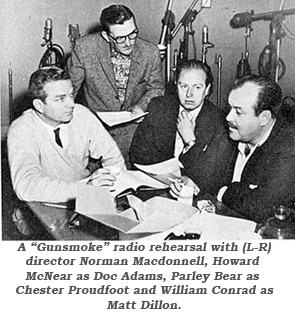 “Around Dodge City and into the territory west there’s just one way to handle the killers and the spoilers—that’s with a U.S. Marshal and the smell of gunsmoke. ‘Gunsmoke’…starring William Conrad…the story of the violence that moved west with young America, and the story of a man who moved with it. I’m that man…Matt Dillon, United States Marshal…the first man they look for and the last man they want to meet.” “Around Dodge City and into the territory west there’s just one way to handle the killers and the spoilers—that’s with a U.S. Marshal and the smell of gunsmoke. ‘Gunsmoke’…starring William Conrad…the story of the violence that moved west with young America, and the story of a man who moved with it. I’m that man…Matt Dillon, United States Marshal…the first man they look for and the last man they want to meet.”
“Gunsmoke” existed due to the vision and persistence of director/producer Norman Macdonnell and writer John Meston who were committed to ending
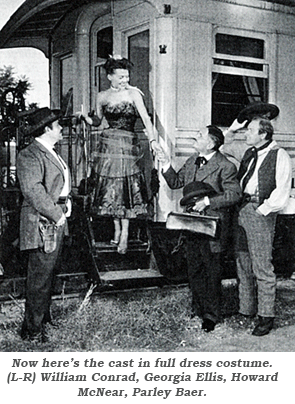 the radio traditions that Westerns were for kids. They envisioned a realistic Western for an adult audience, determined to avoid the clichés of B-movie and radio Westerns. In mid-April 1952 with the cancellation on CBS of “Operation Underground”, the network gave Macdonnell and Meston a week to get their adult Western ready for air. Many actors had previously been auditioned—Rye Billsbury, Howard Culver, John Dehner—but Macdonnell and Meston wanted William Conrad for Matt Dillon. Parley Baer as deputy Chester Proudfoot and Howard McNear as Doc Adams were quickly added with the radio traditions that Westerns were for kids. They envisioned a realistic Western for an adult audience, determined to avoid the clichés of B-movie and radio Westerns. In mid-April 1952 with the cancellation on CBS of “Operation Underground”, the network gave Macdonnell and Meston a week to get their adult Western ready for air. Many actors had previously been auditioned—Rye Billsbury, Howard Culver, John Dehner—but Macdonnell and Meston wanted William Conrad for Matt Dillon. Parley Baer as deputy Chester Proudfoot and Howard McNear as Doc Adams were quickly added with
Georgia Ellis as Kitty Russell. Parley Baer amassed roles on over 1,500 radio programs. His longtime friend, noted radio actress Peggy Webber, told WC, “I worked the very first radio show he did in this town when he’d just come out of the
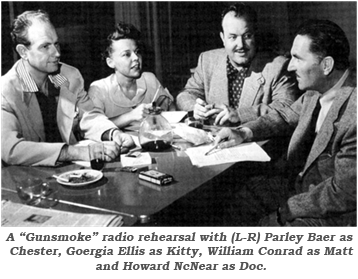 service…about 1944. He was the most considerate, generous, wonderful human being I ever worked with. Not only in his work as an actor was he generous but he was generous in his private and personal life. If you had any tragedy in your family, he was always the first to call or be there. He would always come up with some cheerful story…he never got off the phone without doing that. He would always lift your spirits. He was an angel on earth, the genuine article of what a human being should be. And he always had such a sense of humor. He was the greatest raconteur…everybody was laughing all the time he was in rehearsal with us. It was a special gift he had that he could hold a whole group of professional actors…they would just love to listen to him because he always had special stories no one ever knew. He loved to spread good will. He was a great plus to have in any company.” service…about 1944. He was the most considerate, generous, wonderful human being I ever worked with. Not only in his work as an actor was he generous but he was generous in his private and personal life. If you had any tragedy in your family, he was always the first to call or be there. He would always come up with some cheerful story…he never got off the phone without doing that. He would always lift your spirits. He was an angel on earth, the genuine article of what a human being should be. And he always had such a sense of humor. He was the greatest raconteur…everybody was laughing all the time he was in rehearsal with us. It was a special gift he had that he could hold a whole group of professional actors…they would just love to listen to him because he always had special stories no one ever knew. He loved to spread good will. He was a great plus to have in any company.”
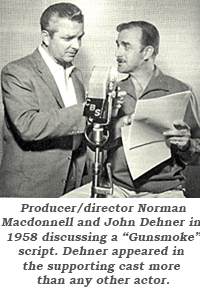 Norman Macdonnell developed a stock company of talented radio actors who worked well together to fill out the supporting casts: John Dehner, Vic Perrin, Lawrence Dobkin, Harry Bartell, Sam Edwards, James Nusser, Virginia Christine, Jeanne Bates, Virginia Gregg, Paul Dubov, Dick Beals, Lou Krugman, Jack Kruschen, Jeanette Nolan, Tom Tully, Don Diamond, among others. Norman Macdonnell developed a stock company of talented radio actors who worked well together to fill out the supporting casts: John Dehner, Vic Perrin, Lawrence Dobkin, Harry Bartell, Sam Edwards, James Nusser, Virginia Christine, Jeanne Bates, Virginia Gregg, Paul Dubov, Dick Beals, Lou Krugman, Jack Kruschen, Jeanette Nolan, Tom Tully, Don Diamond, among others.
Three writers wrote the majority of the scripts—John Meston wrote nearly half of the radio episodes, Les Crutchfield and Marian Clark wrote 95 and 76 scripts respectively. Macdonnell, Kathleen Hite and others made script contributions as well as William Conrad, Vic Perrin and Harry Bartell. The scripts were so good that during the first four seasons of “Gunsmoke” on TV, over 90% of the first 156 TV episodes were adapted from radio scripts.
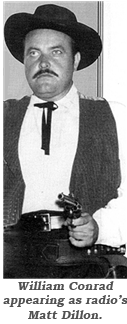 In all, between the first episode on Saturday April 26, 1952 and June 18, 1961, 480 “Gunsmoke” programs were heard over nine seasons. The show was originally heard Saturday night at 9:30, moving up to 8pm Saturday from January to July ‘54. The program briefly moved to Monday from July to September in ‘54 but was back to Saturday night from October ‘54 to October ‘55. “Gunsmoke” finished out its run on CBS Sunday evenings from October ‘55 to June ‘61. ^ ^ By the early ‘60s radio drama had succumbed to television. On June 18, 1961, with “The Letter of the Law”, the most successful and influential radio Western left the airwaves. (For much, much more on “Gunsmoke”—radio and TV—seek out SuzAnne and Gabor Barabas’ 836 page GUNSMOKE: A COMPLETE HISTORY [McFarland, 1990].) In all, between the first episode on Saturday April 26, 1952 and June 18, 1961, 480 “Gunsmoke” programs were heard over nine seasons. The show was originally heard Saturday night at 9:30, moving up to 8pm Saturday from January to July ‘54. The program briefly moved to Monday from July to September in ‘54 but was back to Saturday night from October ‘54 to October ‘55. “Gunsmoke” finished out its run on CBS Sunday evenings from October ‘55 to June ‘61. ^ ^ By the early ‘60s radio drama had succumbed to television. On June 18, 1961, with “The Letter of the Law”, the most successful and influential radio Western left the airwaves. (For much, much more on “Gunsmoke”—radio and TV—seek out SuzAnne and Gabor Barabas’ 836 page GUNSMOKE: A COMPLETE HISTORY [McFarland, 1990].)
| |
|

